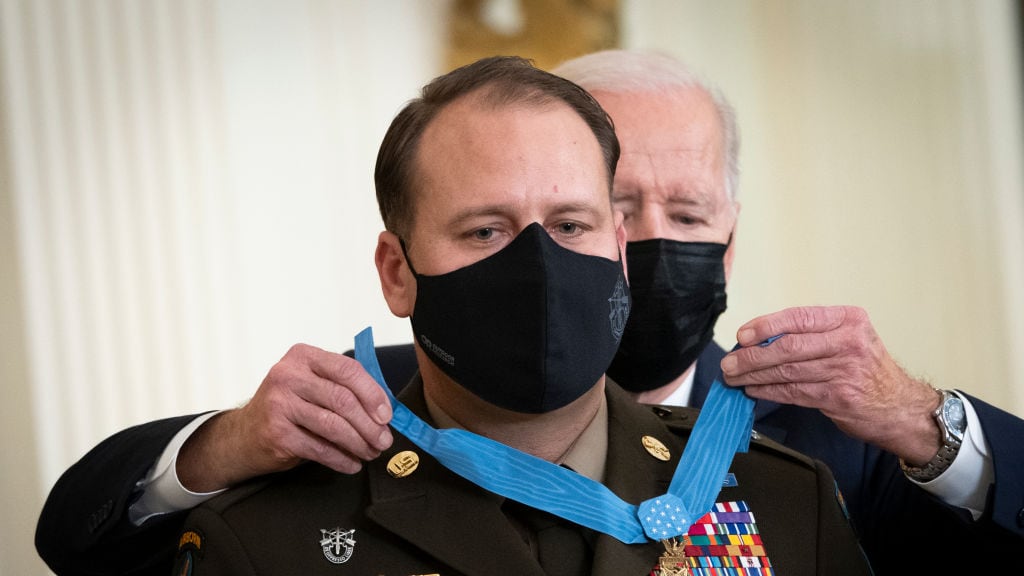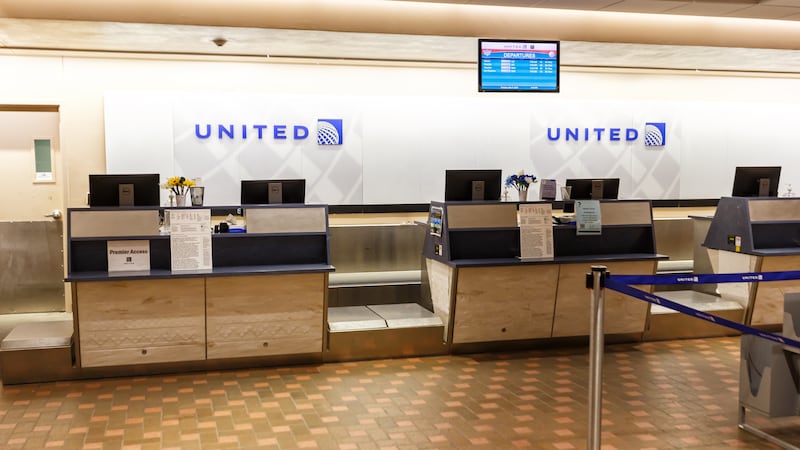WASHINGTON, D.C. — In a ceremony at the White House on Thursday, President Biden awarded the Medal of Honor to three men, including Master Sergeant Earl D. Plumlee of the United States Army, who is based at Fort Lewis.
The Medal of Honor will be awarded to Sergeant First Class Alwyn C. Cashe, United States Army; Sergeant First Class Christopher A. Celiz, United States Army; and Master Sergeant Earl D. Plumlee, United States Army.
Master Sergeant Earl D. Plumlee will receive the Medal of Honor for his actions above and beyond the call of duty on Aug. 28, 2013, while serving in Afghanistan during Operation Enduring Freedom.
In a statement from the White House, then-Staff Sergeant Plumlee’s actions were described as:
While deployed to Afghanistan, then-Staff Sergeant Plumlee instantly responded to a complex enemy attack that began with a massive explosion that tore a sixty-foot breach in the base’s perimeter wall.
Ten insurgents wearing Afghan National Army uniforms and suicide vests poured through the breach.
Staff Sergeant Plumlee and five Special Operations members, intent upon defending the base, mounted two vehicles and raced toward the site of the detonation.
The vehicles, now no longer under cover, came under effective enemy fire from the front and right.
Using his body to shield the driver from enemy fire, he instinctively reacted, exiting the vehicle while simultaneously drawing his pistol and engaging an insurgent to the vehicle’s right.
Without cover and with complete disregard for his own safety, he advanced on the superior enemy force engaging multiple insurgents with only his pistol.
Upon reaching cover, he killed two insurgents, one with a well-placed grenade and the other by detonating the insurgent’s suicide vest using precision sniper fire.
Again, disregarding his own safety, he left cover and advanced alone against the superior enemy force engaging several combatants at close range, including an insurgent whose suicide vest exploded a mere seven meters from his position.
Undeterred and resolute, he joined a small group of American and Polish Soldiers, who moved from cover to counter-attack the infiltrators.
As the force advanced, he engaged an insurgent to his front left.
The wounded insurgent threw a grenade before detonating his suicide vest.
Staff Sergeant Plumlee then swung around and engaged another insurgent who charged the group from the rear.
The insurgent detonated his suicide vest, mortally wounding a U.S. Soldier.
Staff Sergeant Plumlee, with complete disregard for his own safety, ran to the wounded Soldier, carried him to safety, and rendered first aid.
He then organized three Polish Soldiers for defense, methodically cleared the area, remained in a security posture, and continued to scan for any remaining threats.
Master Sergeant Plumlee enlisted in the Oklahoma Army National Guard in 1998 and joined the U.S. Marine Corps in 2000, serving until 2008.
Master Sergeant Plumlee enlisted in the U.S. Army in 2009 and was deployed to Iraq and Afghanistan.
He currently serves as a senior weapons sergeant with Headquarters and Headquarters Company, 1st Special Forces Group at Fort Lewis.
Sergeant First Class Alwyn C. Cashe will receive the Medal of Honor posthumously for actions above and beyond the call of duty while serving in Iraq during Operation Iraqi Freedom in 2005.
In a statement from the White House, Sergeant First Class Cashe’s actions were described as:
While on a night-time mounted patrol near an enemy laden village, the Bradley Fighting Vehicle which Sergeant First Class Cashe was commanding, was attacked by enemy small arms fire and an improvised explosive device which disabled the vehicle and caused it to become engulfed in flames.
After extracting himself he set about extracting the driver who was trapped in the vehicle.
After opening the driver’s hatch, Sergeant First Class Cashe and a fellow Soldier extracted the driver, extinguished the flames on him, and moved him to a position of relative safety.
During the course of extinguishing the flames on the driver and extracting him from the vehicle, Sergeant First Class Cashe’s fuel-soaked uniform ignited causing severe burns to his body.
He then moved to the rear of the vehicle to continue in aiding his peers who were trapped in the troop compartment.
At this time, the enemy noted his movements and began to direct their fire on his position.
When another element of the company engaged the enemy, Sergeant First Class Cashe seized the opportunity and moved into the open troop door and aided four of his peers in escaping the burning vehicle.
Having extracted the four Soldiers, he noticed two other Soldiers had not been accounted for and he again entered the burning vehicle to retrieve them.
Despite the severe second and third-degree burns covering the majority of his body, Sergeant First Class Cashe persevered through the pain to encourage his fellow Soldiers and ensure they received needed medical care.
When medical evacuation helicopters began to arrive, he selflessly refused evacuation until all of the other wounded Soldiers were first evacuated.
Sergeant First Class Cashe’s heroic actions, at the cost of his life, saved the lives of his teammates.
Born on July 13, 1970, Sergeant First Class Alwyn C. Cashe enlisted in the U.S. Army in 1989, serving two years in Korea, followed by three years at Fort Lewis.
He was deployed to support the Gulf War in 1991.
In 1993, he served another year-long tour in Korea.
Sergeant First Class Cashe then served as a squad leader for two years at Fort Hood, Texas, then two years in Germany.
He served two and a half years as drill sergeant at Fort Benning, Georgia.
He returned to Europe in 2001 and served in Germany for two years as a squad leader.
In 2004, Sergeant First Class Cashe served as a platoon sergeant at Fort Benning.
He was deployed to Iraq in support of Operation Iraqi Freedom in 2005.
Sergeant First Class Christopher A. Celiz will receive the Medal of Honor posthumously for actions above and beyond the call of duty while serving in Afghanistan during Operation Freedom’s Sentinel in 2018.
In a statement from the White House, Sergeant First Class Celiz’s actions were described as:
While deployed to Afghanistan, Sergeant First Class Celiz led an operation to clear an area of enemy forces and thereby disrupt future attacks against Afghan and allied forces.
When a large enemy force attacked, Sergeant First Class Celiz voluntarily exposed himself to intense enemy machine gun and small arms fire to retrieve and employ a heavy weapon system, thereby allowing U.S. and partnered forces to regain the initiative, maneuver to a secure location and begin treatment of a critically wounded partnered force member.
As the medical evacuation helicopter arrived, it was immediately engaged by accurate and sustained enemy fire.
Knowing how critical it was to quickly load the casualty, Sergeant First Class Celiz willingly exposed himself to heavy and effective enemy fire to direct and lead the evacuation.
Sergeant First Class Celiz made a conscious effort to ensure his body acted as a physical shield to his team carrying the casualty and the crew of the aircraft.
As the casualty was loaded and Sergeant First Class Celiz’ team returned to cover, he alone remained at the aircraft, returning a high volume of fire and constantly repositioning himself to act as a physical shield to the aircraft and its crew.
Sergeant First Class Celiz then placed himself directly between the cockpit and the enemy, ensuring the aircraft was able to depart.
As the helicopter lifted off, Sergeant First Class Celiz was hit by enemy fire.
Fully aware of his own injury, but understanding the peril to the aircraft from the intense enemy machine gun fire, Sergeant First Class Celiz motioned to the aircraft to depart rather than remain to load him.
His selfless actions saved the life of the evacuated partnered force member and almost certainly prevented further casualties among other members of his team and the aircrew.
Sergeant First Class Celiz died of wounds he received in combat on July 12, 2018 in Paktia Province, Afghanistan.
Born on Jan. 12, 1986, Sergeant First Class Christopher A. Celiz enlisted in the U.S. Army in 2006.
He served at Fort Hood, Texas before he was deployed to Afghanistan several times, starting in 2013.
The Medal of Honor is awarded to members of the Armed Forces for showing exemplary bravery at the risk of their own lives, up and beyond the call of duty.
Instances include engaging in action against an enemy of the United States, engaging in military operations against a foreign force or serving with friendly forces in a conflict against an opposing armed force where the United States is not a belligerent party.
Conduct must include great personal bravery or self-sacrifice that is clearly above his or her comrades and must involve risk of life.
Additionally, there must be incontestable proof of the performance of the conduct and each recommendation for the award must be considered on the standard of extraordinary merit.
©2021 Cox Media Group








